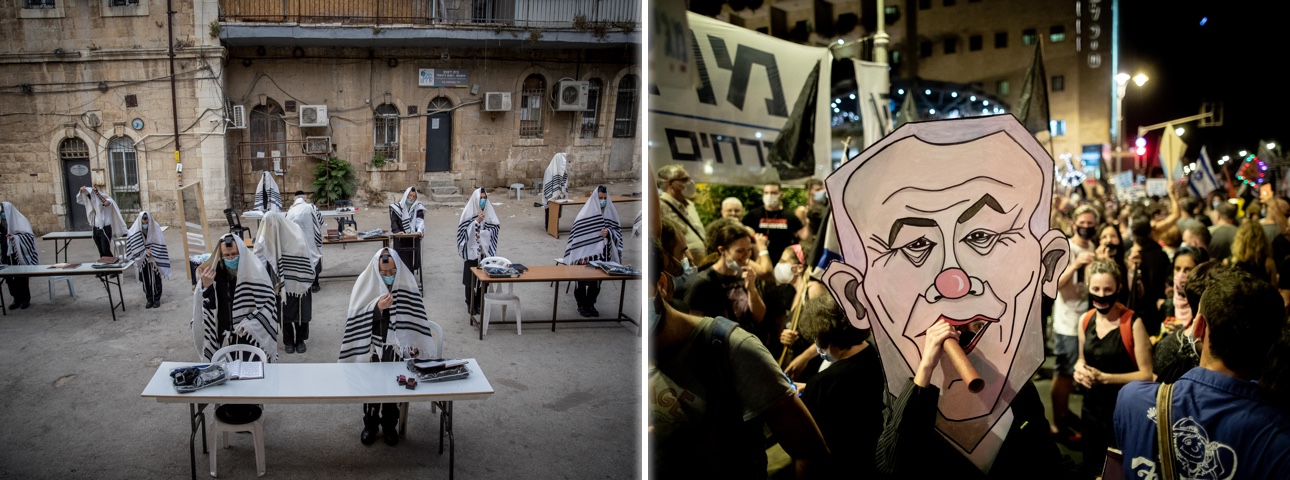Cries of Protest vs. Cries of Prayer
Protest is essential during lockdown. So is prayer. Even if freedom of expression is constitutionally ranked above communal prayer, tipping the scales between them undermines public confidence.

Flash 90
The sharp contrast between the permission to hold mass protest demonstrations on the one hand and the restrictions imposed on prayer services on the other, is disturbing to many, and rightly so. Many sectors of the Israeli public, both the observant and the traditional, feel that their values are not being treated with the same degree of respect as are other values. Among those who see themselves as victims of discrimination and of a double standard the willingness to comply with the restrictions is on the wane.
The restrictions imposed in response to the coronavirus pandemic are not merely technical. They express, sometimes unwittingly, normative considerations and ethical priorities. What we are seeing today is that protests take precedence over prayer. Is this the appropriate balance in a Jewish and democratic state? There is no doubt that political demonstrations are of paramount importance especially now; but so is prayer. Both need to be conducted with much greater caution, and under the same guidelines, based on a balance that recognizes prayer and the values of Jewish identity it represents, while also preserving democracy and freedom of expression.
All agree that the constitutional, political, health, and economic crises are legitimate grounds for protest, and that, in a democratic regime, demonstrations are a key vehicle for expressing criticism of the government. A series of court rulings has established that the rights of assembly and demonstration are fundamental and essential, and has cast a jaundiced eye on attempts by the law-enforcement agencies to curb demonstrations for one excuse or other. In effect, curtailing the possibility of demonstrating means that the Government is stifling criticism.
But the crisis also assails other needs and values. For many Israelis, the most painful blow of all is the ban on public prayer in synagogues—which is the focal point for the expression of Jewish identity and culture. If in routine times this would be a troubling development, on the High Holy Days, when synagogue prayers are their defining feature of, it is far more painful. This assault on the fabric of religious life is also an assault on a constitutional principle: the right to freedom of religion and the right to express culture and identity, which is one of the constitutional pillars of Israel. The court has also defended this right in a series of verdicts, recognizing the emotional and existential value that observance of religious precepts, such as prayer, has for an observant Jew in the Jewish state.
Even if the Israeli constitutional “ranking” grants higher priority to freedom of expression, it is doubtful whether such a sweeping attack on the freedom of religion reflects an appropriate attitude towards prayer. A Jew, who is unable to pray in his or her synagogue on the Day of Atonement, cannot accept this ranking with equanimity, certainly not in light of the photos of yet another demonstration on Balfour Street. At the same time, we must stress the major difference between the restrictions on prayer and the restrictions on demonstrations: while no one suspects that the ban on public prayer stems from a rejection of its value, limitations on demonstrations do indeed arouse a suspicion that those who impose them are driven by illegitimate considerations.
The current pandemic has once again sharpened the duality of Israel’s constitutional principles-- “Jewish” and “democratic”. Is it possible to tip the scales between them without creating a sense of discrimination and undermining public confidence in the rules? Our starting point must be that both protest demonstrations and public prayer are essential values. When restrictions are imposed on one or the other—both of which are activities that are essential values for Israeli citizens, we must make sure that the standards applied to them are identical, transparent, ; respectful of constitutional values and the desire to engage in these activities, while also taking account the relevant medical data and the scope of the resources needed to make them possible, despite the limits imposed by the pandemic. In this way, not only will we arrive at the appropriate balance between different values, we will also boost the public’s trust in government policy.
The article was published in the Times of Israel.
